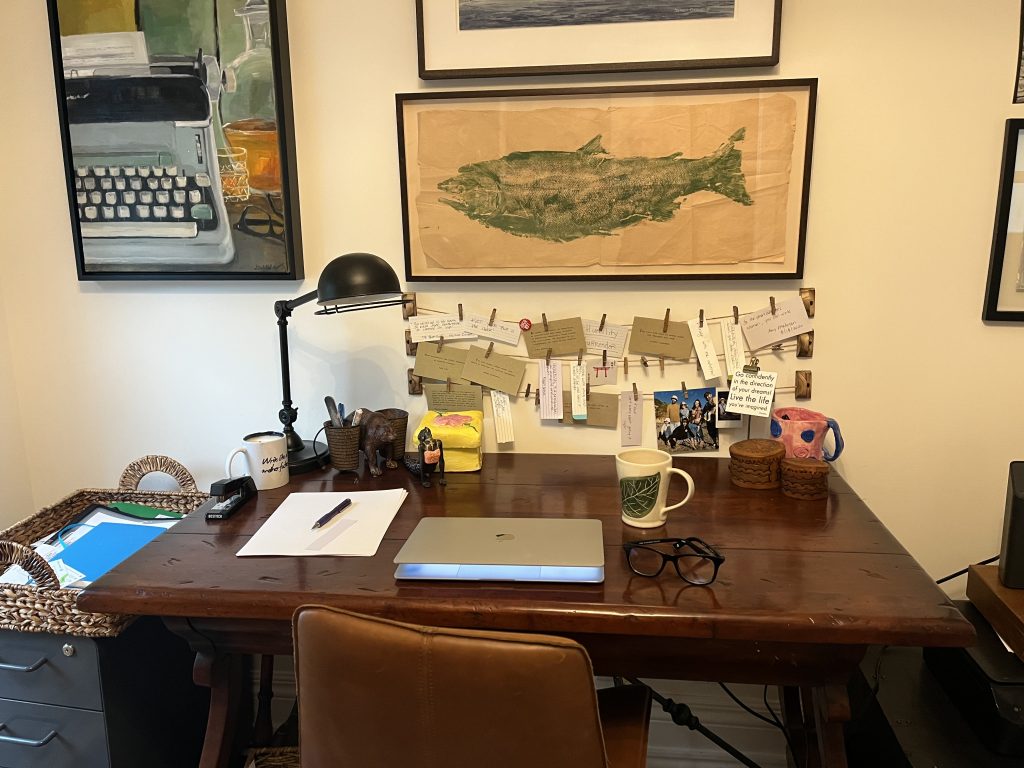After attending a weekend memoir writing workshop at UCLA, I came home and wrote. This has become my predictable side effect after sitting in a classroom or in front of a zoom screen for two or three days of writing teacher-given prompts, then humbly sharing our work. One would think the first thing I’d want to do after two or three or even four days of an intensive writing workshop, would be to put my pen down, but it’s the opposite. Feeling inspired and heeding the suggestions that came from workshopping my pieces, I always look forward to continuing the process when the class is over. On the last day of class, zoom or in person, we share our writing goals with the class and six months later, we regroup on zoom for accountability. Those first few days post class, I begin to think about increasing my daily writing time and giving more weight to my goals, but after a few months, I settle back into my newly adjusted normal as the enthusiasm of the class wanes. I’m sure I’m not the only one in the class that does this. This time when I returned to Boulder, post class, I was met with a string of cold, rainy days. Not that I need gloomy weather to inspire writing, but it sure does help. Besides, I cherish the gray, rainy, gloomy days that tell me I need to stay indoors and leave my hiking boots at the door. They are rare where I live. And so I did. I called indoor recess, got my coffee, got comfortable at my desk and started typing. It wasn’t long before I had written 5,000 words, or about ten pages. Everything about what I was doing was routine except for one very big thing. I was writing fiction, not memoir, which was new, very unexpected and not at all what I had been doing at the workshop I had just attended.
A few weeks before the workshop, my son, Grant, asked me why I never wrote fiction. It wasn’t the first time he had asked me that, but it was the first time I really paid attention to his question.
“Because I don’t know how, or more specifically, I don’t have a plot in mind,” was my answer.
He pushed.
“But you’re so good at making stuff up.”
He was right with that. I am good at making stuff up, but more in a way to skirt trouble when I was young while answering my parents ever familiar question of “where have you been, young lady?” Necessity, not creativity. Making up stories about random people I see or sometimes don’t see, is something I’ve enjoyed for as long as I can remember, both with my sisters and my children. Several years ago driving from LA to Ojai with my LA kids to celebrate my birthday, someone in the car (who wasn’t me) started talking about a woman named Kendra and her most recent escapade at work. It took me a few minutes to realize, oh, we’re doing that… then I joined right in adding to the comments about Kendra and the last insurance convention she attended, which was a bit of a disaster as everyone in the car recalled. Of course we all had pictures in our mind of Kendra- what she looked like, how she talked, and of course what she did at the convention to make it memorable in all of our made-up stories. Random conversations about a made up person just begin with my kids and I. There is never any rhyme or reason to any of it and I remember being especially amazed at the fine tuned ability everyone in the car had, not missing a detail. They’ve paid attention and have learned by listening. Of course the farther into the story we got, the funnier it became, which feeds all of the storytellers. Responses were seamless, as if we were reading scripts. I realized my kids had all witnessed me doing this with my sisters and without any instruction or prompts from me, had carried on the tradition proudly and passed it onto their partners. I remember a fun birthday celebration in Ojai, but remember the stories about Kendra at the convention even more.
This has happened at airports, restaurants, hikes and stores with my sisters and with quick lightning rounds while waiting next to a car at a stop light. I have no idea where this odd game of ours originated, but we’ve all got it and we all love doing it. People outside of our storytelling family have reacted in one of two ways — they joined right in without explanations as to what we are doing or why, or they look puzzled and confused and explaining the odd behavior that we’ve taken to such ridiculous lengths is never easy.
“I guess I just don’t know how to start,” I told Grant.
“Just make up a character and write stuff that happens to that character every day—like the stuff we make up. You already know how to do this, mom.”
And so taking Grant’s challenge, I started writing. I wrote about a girl I’ve thought about for a long time, not really knowing why and definitely not realizing she would become the heroine in my book. Situations started unfolding for my 10-year-old, made up heroine. Things I hadn’t predicted. Things that surprised me. It felt like the book started writing itself and although I was behind every word, every paragraph, every page, Tink, my heroine, was guiding me.
I remember once hearing an author tell an interviewer that she was so surprised when the main character in the book she had written, died. The interviewer said, “but you were the one writing the book… you were the one that killed her!” Her response was that the book started writing itself, leading her down unexpected pathways with unexpected consequences. I’ve thought about that interview a lot, believing the author, but not understanding what she was saying. I got a glimpse of that while I wrote, not knowing what was going to happen to my heroine or how the book would end. 5,000 words turned to 10,000 then 20,000 and finally my short story grew to a novel with 75,000 pages. I’m still not exactly sure how it happened but it did and almost two months to the date of Grant asking me why I never wrote fiction, my answer to that was, “I do now.”
I loved the freedom of being able to write down what came to mind, making things up without a thought to whether or not my memory was serving me correctly. Using characters to show, not tell, that were formed with my words —families and friends, the loved and the not so loved, all with the stroke of my keyboard. It was a blank canvas ready for paint, instead of finding the puzzle pieces of memories that would lead to other memories once I started piecing them together. It was exhilarating and energizing and made all day stretches at my desk not only tolerable, but enjoyable. And the rain kept coming. Maybe my book’s dedication needs to not only be to my son, Grant, who put me on this journey in the first place, but also to the rainy May weather in Boulder. I’m not sure I would have been motivated had it been sunny outside, which may sound ridiculous, but anyone who knows me well understands the motivation that gray days bring me. Ironically, I live in a state that claims to have 300 sunny days a year and believe me, people who live here keep track.
Once I put the final period on the last sentence, I took my work to Office Depot to be printed. I wanted to hold the weight of 75,000 words in my hands. While I stood at the copy machine, watching the pages come out of the printer and stack themselves onto the tray, I could’t help but think of the hours I sat at my computer in my office looking at the 3 mini-clothes lines that hang on the wall above my desk. Using tiny clothes pins, I’ve hung phrases or words that inspire me or remind me (“enough of the adverbs”… or… “keep your butt in the chair”…). These two are the ones that I kept looking at and eventually moved to the center of the twine.
“Creativity is a combination of discipline and child-like spirt.” Robert Greene
“The job of the novelist is to invent: to embroider, to color, to embellish, to make things up.” – Donna Tart
I don’t know where the two inch stack of paper sitting on the side of my desk will end up, but right now, just looking at it and picking it up and feeling its weight is enough. There was a freedom that came from creating something from nothing that I’m relishing in. To create people and stories and histories where they didn’t exist before feels like pure magic to me and after spending 75,000 words with my main characters, it’s not surprising that they have woven themselves into my day to day life. The other day I said something to a clerk in the grocery store and as soon as the words came out of my mouth, I hesitated and the thought that it was exactly what Tink, my protagonist, would have said. I have made up a world of imaginary friends who evidently are still hanging around.
Hopefully, I’ll be able to share more about this book later, but for now, just this page:
Dedicated to Grant, who asked me why I never write fiction. I do now.

